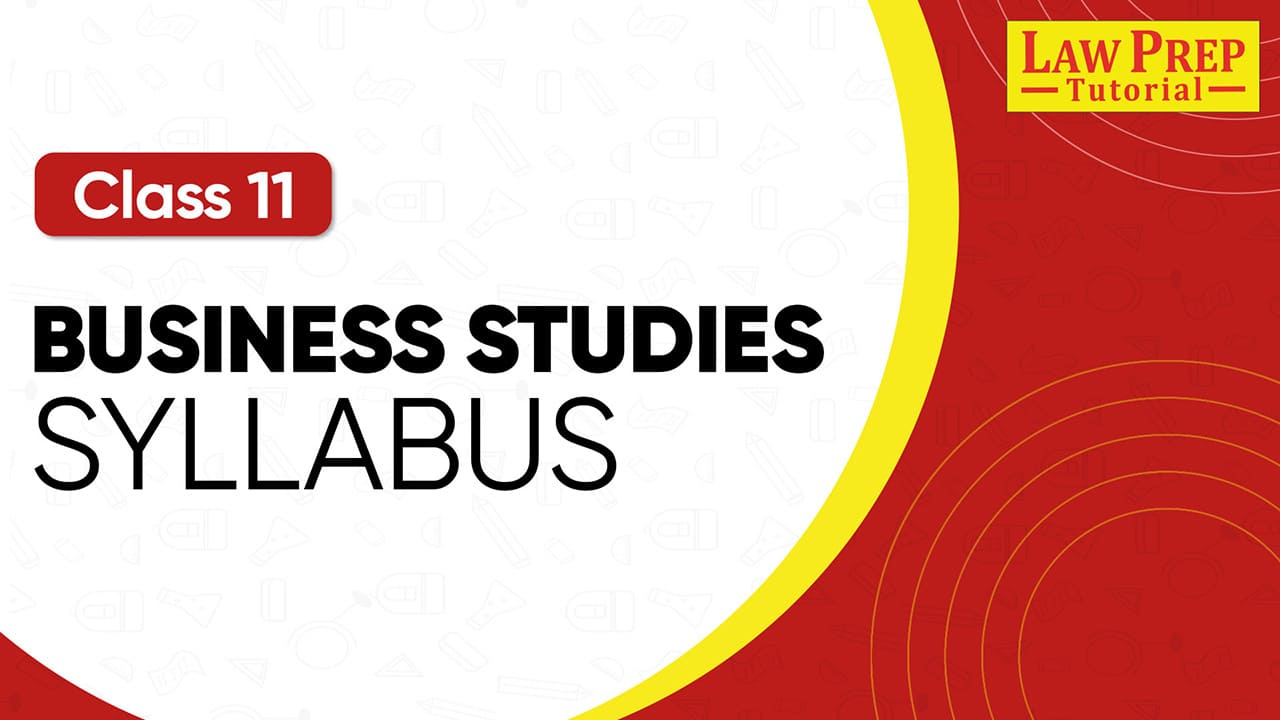As a commerce student, one of the most important subjects you study in Class 11 is Business Studies (BST). To prepare well, you need a clear understanding of the CBSE Class 11 Business Studies syllabus for the 2026-27 session.
This subject helps you explore the basics of trade, forms of business, finance, and the role of ethics in decision-making. Below, we provide the complete syllabus of Class 11 Business Studies subject with unit-wise details, marks distribution, project guidelines, and prescribed books.
With this structured outline, you can plan your preparation effectively and perform confidently in exams.
Class 11 Business Studies Syllabus 2026-27: Overview
Find the quick overview of class 11th BST syllabus:
| Part | Units Covered | Marks |
| Part A: Foundations of Business | 1. Nature and Purpose of Business 2. Forms of Business Organisations 3. Public, Private and Global Enterprises 4. Business Services 5. Emerging Modes of Business 6. Social Responsibility of Business and Business Ethics | 40 |
| Part B: Corporate Organisation, Finance and Trade | 7. Sources of Business Finance 8. Small Business and Enterprises 9. Internal Trade 10. International Trade | 40 |
| Part C: Project Work | One project based on syllabus guidelines | 20 |
| Total | — | 100 |
📥 Download Class 11 Business Studies Syllabus PDF
Get the complete CBSE Class 11 Business Studies Syllabus 2026-27 PDF directly from CBSE. Keep it handy for detailed study, unit-wise marks distribution, and project guidelines.
Class 11th Business Studies Syllabus 2026-27
Below is the detailed syllabus of class 11 business studies subject, covering all chapters:
Part A: Foundations of Business (40 Marks)
This part of class Xi business studies syllabus introduces you to the fundamentals of business, its objectives, and forms. You will study how business organisations function, the role of public and private enterprises, and the importance of business services such as banking, insurance, and transport.
It also focuses on modern trends like e-business and digital modes of operation. A strong emphasis is placed on ethics and social responsibility, helping you understand how businesses contribute to society.
| Unit | Topics Covered | Marks |
| 1. Nature and Purpose of Business | Concepts, objectives, classification of business activities, industry & commerce | 16 |
| 2. Forms of Business Organisations | Sole proprietorship, partnership, joint stock company, cooperative societies | |
| 3. Public, Private and Global Enterprises | Features, role, and forms of public/private enterprises, multinational companies | |
| 4. Business Services | Banking, insurance, communication, warehousing, transportation | |
| 5. Emerging Modes of Business | E-business, outsourcing | |
| 6. Social Responsibility of Business and Business Ethics | Concept, need, and role in business decisions | |
| Total | — | 40 |
Part B: Corporate Organisation, Finance and Trade (40 Marks)
This part of class 11 BST syllabus deals with business finance and trade. It introduces you to various sources of raising finance and their suitability for different types of businesses. You also learn about the importance of small-scale businesses and how they contribute to the economy.
Internal trade, wholesale, retail, and large-scale trading practices are explained, along with the basics of international trade and its procedures. This section equips you with knowledge of business financing and trade systems, both domestic and global, making it highly relevant for future commerce studies.
| Unit | Topics Covered | Marks |
| 7. Sources of Business Finance | Owners’ funds, borrowed funds, international sources | 20 |
| 8. Small Business and Enterprises | Role of small business, government schemes, rural enterprises | |
| 9. Internal Trade | Wholesale trade, retail trade, large scale retailing, role of chambers of commerce | |
| 10. International Trade | Meaning, export/import procedures, documents required, WTO | |
| Total | — | 40 |
Part C: Project Work (20 Marks)
Project work is a compulsory component of the Class 11 Business Studies syllabus. It helps students connect theory with real-life business practices. Projects may include studying a small business in your locality, preparing a report on e-business, or analysing services offered by banks and insurance companies.
The focus is on research, analysis, and presentation skills. Students are assessed based on topic selection, research depth, report writing, and viva-voce. This section develops critical thinking, decision-making, and application skills that are highly useful in higher studies and practical business environments.
| Project Work Component | Marks |
| Relevance of the topic | 3 |
| Knowledge content/Research work | 6 |
| Presentation technique | 3 |
| Viva-voce | 8 |
| Total | 20 |
More Important Resources for CBSE Exam:
| Class 11th Hornbill Syllabus | CBSE Class 11th Commerce Subjects |
| CBSE Full Form | All about CBSE Class 11th |
| Class 11th Syllabus | Class 12th Syllabus |
| Class 11th Commerce Books | CBSE Board: All details |
Prescribed Books for Class 11 BST Syllabus
The CBSE Class 11 Business Studies syllabus is based on the following NCERT textbooks:
- Business Studies Part I: Foundations of Business (NCERT)
- Business Studies Part II: Corporate Organisation, Finance and Trade (NCERT)
These books are available in both English and Hindi medium. They cover the entire syllabus of Class 11 Business Studies subject and should be your primary study material.
Suggested Project Topics for Class 11 BST Syllabus
Project work is an essential part of the syllabus and helps in practical learning. Here are some suggested project ideas for students:
- A study of a small business in your locality.
- Comparative study of traditional vs. online retail shops.
- Report on services provided by banks or insurance companies.
- Analysis of how advertising influences consumer behaviour.
- Study of a multinational company and its impact in India.
- Report on sources of business finance used by startups.
- Study of e-business models and their advantages.
- Case study on corporate social responsibility practices of a company.
- Role of chambers of commerce in promoting trade.
- Project on export-import procedures with examples.
Class 11 Business Studies Exam Pattern 2026-27
| Component | Details |
| Theory Exam | 80 Marks |
| Project Work | 20 Marks |
| Total | 100 Marks |
| Duration of Theory Exam | 3 Hours |
Class 11 Business Studies Syllabus: Question Paper Design
| Typology of Questions | Learning Outcomes Tested | Marks | Weightage |
| Remembering & Understanding | Recall of facts, terms, concepts, and ideas | 32 | 40% |
| Applying | Applying knowledge, facts, and rules to new situations | 24 | 30% |
| Analysing, Evaluating & Creating | Breaking information into parts, making judgments, solving case studies | 24 | 30% |
| Total | — | 80 | 100% |
Check the latest CBSE Class 11 syllabus for all subjects below:
Tips to Prepare for Class 11 Business Studies Syllabus
1. Start With NCERT Books
Your first priority should always be NCERT textbooks, as they cover the complete syllabus of class 11 business studies subject. Read each chapter thoroughly, highlight key terms, and make short notes for revision.
2. Focus on Case Studies and Examples
Business Studies is full of practical situations. Practice the case studies given in your book and try to relate concepts with real businesses you see around you.
3. Prepare Unit-Wise Notes
Divide your study plan into Parts A, B, and C. Write down important definitions, headings, and sub-points for quick recall before exams.
4. Revise Key Terms and Definitions
Most questions in the CBSE class 11 business studies syllabus revolve around correct usage of terms like “sole proprietorship,” “outsourcing,” or “multinational company.” Keep a glossary of such terms.
5. Don’t Ignore Project Work
Project work carries 20 marks. Choose your topic wisely, keep your file neat, and prepare for viva-voce. A well-done project can help boost your overall score.
6. Solve Sample Papers and PYQs
Practice CBSE sample papers and previous year questions. This helps you understand the exam pattern, question framing, and time management.
7. Stay Updated With Business Trends
Read newspapers, magazines, or reliable online sources to understand current business practices. It will help you answer application-based and case-based questions better.
8. Revise Regularly
Set aside at least 15–20 minutes daily for revision. Regular revision ensures concepts stay fresh and reduces last-minute stress.
Objectives of Class 11 Business Studies Syllabus 2026-27
The CBSE Class 11 Business Studies syllabus has been designed to help students understand the fundamentals of business, finance, and trade in a practical and systematic manner. Its objectives are:
- Develop Business Awareness: To make students familiar with the world of business and its role in economic and social development.
- Understand Forms of Organisations: To provide knowledge about different forms of business organisations and their suitability in various situations.
- Learn Financial Sources: To enable students to understand various sources of business finance and their uses.
- Promote Ethical and Social Responsibility: To instill values of business ethics and the importance of social responsibility in business decisions.
- Acquire Practical Skills: To give hands-on experience through project work so students can connect theoretical knowledge with real-life practices.
- Encourage Critical Thinking: To develop analytical skills for solving business problems and interpreting case studies.
- Prepare for Higher Studies: To create a strong foundation for Class 12 Business Studies and professional courses in commerce and management.
- Help students build a strong base in business concepts and decision-making, which are directly relevant for management entrance exams like IPMAT and CAT.
Early preparation with concepts from Business Studies, supported by online IPMAT coaching, can give students an edge in securing admission to top IIMs.
Read the chapter-wise summaries of Class 11 English here:
FAQs About Class 11 Business Studies Syllabus 2026-27
The syllabus includes two parts – Foundations of Business (40 marks) and Corporate Organisation, Finance & Trade (40 marks), plus project work (20 marks).
There are 10 units in total – 6 units under Part A and 4 units under Part B.
Yes, project work is compulsory and carries 20 marks. Students must complete one project for assessment.
Part A covers Nature and Purpose of Business, Forms of Business Organisations, Public and Private Enterprises, Business Services, Emerging Modes of Business, and Business Ethics.
The exam includes objective, short-answer, case-based, and long-answer questions based on the CBSE Class 11 Business Studies syllabus.
It is mostly theory-based, but project work ensures practical exposure to real business practices.
Yes, with proper preparation, clear understanding of concepts, and neat project work, you can score full marks.
Business Ethics teaches moral values and social responsibility in decision-making, helping students connect business with society.
Yes, NCERT is sufficient as it covers the complete CBSE Class 11 Business Studies syllabus, including examples and exercises.
It covers wholesale trade, retail trade, large-scale retailing, and the role of chambers of commerce.
It includes meaning of international trade, export/import procedures, required documents, and the role of WTO.
Find detailed questions and answers from all chapters of English Class 11 now:
Explore the updated CBSE Class 12 syllabus for all subjects here:
Discover CLAT exam resources that can help you get started early:
Explore CLAT coaching centers across different cities:


